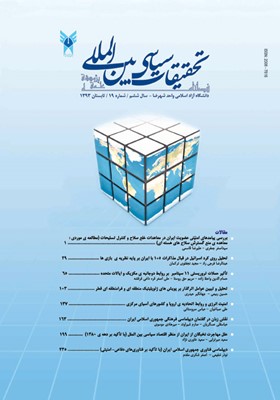امنیت انرژی و روابط اتحادیه اروپا و آسیای مرکزی
محورهای موضوعی : فصلنامه علمی تحقیقات سیاسی و بین المللی
علی صباغیان
1
*
,
عباس سروستانی
2
![]()
1 - استادیار دانشکده حقوق و علوم سیاسی دانشگاه تهران
2 -
کلید واژه: آسیای مرکزی, اتحادیه اروپا, پیمان لیسبون, نظام بین الملل, روابط اتحادیه اروپا و آسیای مرکزی,
چکیده مقاله :
موقعیت ژئواکونومیک و میزان ذخائر و تولید نفت و گاز منطقه آسیای مرکزی در دو دهه گذشته باعث اهمیت روزافزون این منطقه در معادلات بین المللی شده است. به علاوه، وقوع حوادث 11 سپتامبر و همسایگی کشورهای آسیای مرکزی با کانون بحران های جهانی نظیر تروریسم، کشت و قاچاق مواد مخدر و بنیادگرائی، اهمیت ژئوپلتیکی این منطقه را دوچندان و زمینه حضور قدرت های بزرگ را در این منطقه فراهم آورده است. مناقشات روسیه و اوکراین در سال 2008 و 2014 و قطع شدن گاز کشورهای اروپایی، نیز مزید بر علت شده و اتحادیه اروپایی را ترغیب به جستجوی منابع جدید انرژی نمود و به سمت گسترش ارتباطات با کشورهای آسیای مرکزی سوق داد. دامنه این روابط به خصوص بعد از معاهده لیسبون که تلاشی بود برای انسجام و کارآمدی اتحادیه اروپایی در نظام بین الملل، گسترده تر و عمیق تر شد. این معاهده نتایج قابل ملاحظه ای در گسترش ارزشهای اروپایی و توسعه روابط خارجی اتحادیه اروپا با کشورهای در حال توسعه و به خصوص کشورهای نفت خیز آسیای مرکزی داشته است. مقاله حاضر به بررسی علل و زمینه ها و همچنین نقش متغیر انرژی در همکاری اتحادیه اروپا و کشورهای آسیای مرکزی در دو دهه گذشته می- پردازد.
Abstract The geo-economic position and the extent of oil and gas reserves in Central Asia in the past two decades have given an important place to this region in international equations. Besides that, the occurrence of 11September 2001 terrorist attacks and the neighborhood of Central Asia with crises centers and issues like terrorism, cultivation and smuggling of narcotic drugs and fundamentalism have raised the geopolitical importance of the region and prepared the ground for big powers presence. The dispute between Russia and Ukraine in 2008 and 2014 and suspension of natural gas supply to European countries necessitated the search for new source of energy by European Union and they thus, turned to the expansion of relations with Central Asian countries. The sphere of relations was further expanded after the Lisbon Treaty which was an attempt to bring efficiency and coherence to EU place in international system. This convention emphasized on propagation of European values and expansion of relations of EU with the developing countries. The present article examines the causes and grounds of changing role of energy in cooperation of European Union with Central Asian countries and the role and impact of Lisbon Treaty in expansion and institutionalization of these relations in the past two decades. The main question raised by the paper is; what is the place of Central Asia in security of energy of European Union? The underlying hypothesis is the use of energy by Russia as a lever for putting pressure against European Union also the growing need of European Union for import of energy sources have prepared the ground for expansion of cooperation between the European Union and the Central Asian countries. While the relations of European Union with Russia is strained, the expansion of relations of European Union with Central Asian countries can facilitate the process of putting pressure on Russia and will lead to a better negotiating power for European Union vis-à-vis Russia. The finding of the study shows that the European Union has come to the conclusion that asymmetric and imbalanced dependence on Russia for energy and the security threat and repercussion resulted from it in recent years can be balanced by expansion of relations with Central Asian countries and diversification of sources of energy.

